PH does not
tolerate "police impunity", Cayetano asserts
By Office of Senator Alan
Peter S. Cayetano
May 8, 2017
PASAY CITY – Senator
Alan Peter Cayetano, during a gathering of the Filipino community in
Geneva Switzerland, asserted that under Philippine regulations, there
is no police impunity.
“Anyone killed by the police
is investigated. Although the police operations were presumed
legitimate, the presumption is not conclusive,” Cayetano said before
hundreds of Filipinos from Switzerland, Germany, Spain, Germany,
France, Belgium, UK, Italy, and Canada.
“If evidence shows that
there is (EJK) extrajudicial killing, kakasuhan po ang mga alagad ng
batas,” he added.
In a short message addressed
to attendees in the forum organized by Overseas Filipino Workers in
Switzerland, Cayetano cited that in the past, drug lords, the corrupt,
and criminals were acting with impunity.
“They’re not afraid of the
law. The police were afraid of catching them. Dahil sila pa ang
makakasuhan. The fiscals were afraid of powerful organizations,”
Cayetano said.
The Philippine National
Police-Internal Affairs Services (PNP-IAS) is mandated to conduct motu
proprio investigations during incidents a) where a police personnel
discharges a firearm; b) where death, serious physical injury or any
violation of human rights occurred in the conduct of police
operations; c) where evidence was compromised, tampered with
obliterated or lost while in the custody of police personnel; d) where
a suspect in the custody of the police was seriously injured ; and e)
where the established rules of engagement have been violated.
To prevent police impunity,
the National Police Commission (NAPOLCOM) and the Philippine National
Police have existing policies and guidelines to discipline their
personnel and officials. The NAPOLCOM issued MC No. 2016-002 dated 7
March 2016 revising the uniform rules of procedures before the
administrative disciplinary authorities and the PNP Internal Affairs
Service.
Cayetano, together with
Deputy Executive Secretary Menardo Guevarra, is in Geneva to lead the
Philippine delegation attending the Universal Periodic Review on May
8.
The team is expected to
present the human rights-based development programs of the Philippines
and the measures adopted to fulfill its obligations to the eight (8)
International treaties ratified in the past years.
The delegation includes
representatives from the Presidential Human Rights Committee, Deputy
Speaker of the House of Representatives, Department of Foreign Affairs
(DFA), Department of Justice (DOJ), Department of Health (DOH),
Department of Interior and Local Government (DILG), Department of
Labor and Employment (DOLE), the Philippine Drug Enforcement Agency (PDEA),
the Philippine National Police (PNP), Department of Social Welfare and
Development (DSWD), the National Economic Development Authority (PDEA),
the Armed Forces of the Philippines (AFP), and the National Commission
on Indigenous Peoples (NCIP).
Hindus urge UNESCO
to deny Japan’s Okinoshima Island heritage status unless women allowed
on it
Press
Release
May 8, 2017
Hindus are urging the UNESCO
World Heritage Committee, whose 41st session is meeting in Krakow
(Poland) on July 2-12, not to endorse Okinoshima Island of Japan for
the World Heritage Site status, unless women are also permitted on
this Island.
“Okinoshima Island and
Related Sites in Munakata Region”, where the women are not allowed to
set foot and which is on the Tentative List under Japan in the UNESCO
World Heritage Convention since 2009, would reportedly be on the
agenda of this Committee session for nomination to World Heritage
List.
Hindu statesman Rajan Zed,
in a statement in Nevada (USA) today, urged Committee Chairperson
Jacek Purchla (Poland); Rapporteur Muhammad Juma (Tanzania);
Vice-Chairpersons Angola, Kuwait, Peru, Portugal, Republic of Korea;
and the rest 14 States Parties to either not include Okinoshima Island
on the agenda or to reject it during the meeting; unless Japan ensured
that women would be permitted in the same status as men on this
Island.
Zed, who is President of
Universal Society of Hinduism, stated that women deserved equal rights
and opportunities and this gender discrimination at the Island needed
to end right now as it was highly inappropriate and out-of-line.
Moreover; the United Nations
Educational, Scientific and Cultural Organization (UNESCO), where
“Gender Equality” is one of the two “Global Priorities”, should not be
in business of rewarding the monuments/sites which refused to treat
women with equality and respect they deserved; Rajan Zed noted.
UNESCO, which “considers
gender equality as a fundamental human right, a building block for
social justice and an economic necessity”, should be embarrassed of
its actions of placing this Island even on its Tentative List of
heritage sites. It seemed that UNESCO Director-General Irina Bokova
and Executive Board Chairperson Michael Worbs needed to re-read and
re-grasp the priorities and goals of the organization, Zed indicated.
Rajan Zed, quoting
scriptures, explained that ancient Manusmriti said: “Where women are
revered, there the gods are pleased; where they are not, no rite will
yield any fruit.”
Men and women were equal in
the eyes of God; Zed said, and urged His Holiness Pope Francis and
other world religious leaders to strongly speak on this gender
equality issue. How could the “men-only” island be on the UNESCO World
Heritage List? Zed wondered.
The Committee has the final
say on whether a property is inscribed on the World Heritage List. The
21 States Parties of the current World Heritage Committee are: Angola,
Azerbaijan, Burkina Faso, Croatia, Cuba, Finland, Indonesia, Jamaica,
Kazakhstan, Kuwait, Lebanon, Peru, Philippines, Poland, Portugal,
Republic of Korea, Tunisia, Turkey, United Republic of Tanzania, Viet
Nam, Zimbabwe.
A description of Okinoshima
Island on UNESCO website includes: “where from the fourth to the tenth
centuries national religious rituals were conducted to supplicate the
gods” and “where gods descended to live in this world”. A “Nomination
Dossier” was prepared by Japan’s Agency for Cultural Affairs for this
site in January 2016.
Philippine UPR
Watch holds human rights exhibit in Geneva
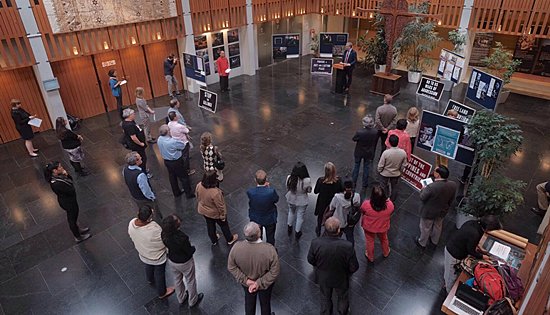
Press Release
May 6, 2017
GENEVA – World Church
leader calls for minute of silence for human rights victims in
Philippines.
“Sisters and brothers from
the Philippines, we are following your work and we are supporting you
in raising one voice for justice. Therefore, one voice for peace.”
This was the gist of a
statement made by the World Council of Churches General Secretary Rev.
Dr. Olav Fykes Tveit in his opening remarks during the formal opening
of the photo exhibit sponsored by the UPR Watch Philippines on May 5,
2017 at the World Council of Churches (WCC) Ecumenical Center in
Geneva, Switzerland. Dr. Tveit called for one minute of silence to
remember the numerous victims of extrajudicial killings and political
prisoners still languishing in various detention centers in the
country.
“We stand for those who
oppressed. We search for the truth. We let the truth speak to us and
we share it to the world,” Tveit said, referring to victims of
extra-judicial killings and political prisoners still languishing in
different Philippine jails.
WCC is the broadest and
among the most inclusive international ecumenical organization which
counts among its members 345 protestant churches, institutions and
church fellowship with an ECOSOC status with the United Nations.
The photo exhibit organized
by the Philippine UPR Watch is part of a series of events organized by
the Philippine UPR Watch in time for the 3rd Cycle of the Universal
Periodic Review of the Philippines. The exhibit showcases various
photographs by top Filipino photojournalists that graphically depicts
cases of human rights violations under both the present and past
administrations. It focused on the brutality of the anti-drug campaign
being waged by the Duterte Government. The exhibit also portrays the
plight of political prisoners and other forms of human rights
violations perpetrated against the indigenous peoples and national
minorities.
“It is of utmost concern for
us that despite the UPR, human rights violations still occur in the
Philippines, and is in fact worsening. What is even worst is the fact
that both the Aquino and the Duterte Administrations are dismissive of
the accusations that human rights violations were, and are being
committed under their watch,” said Atty. Ephraim B. Cortez, secretary
general, National Union of Peoples Lawyers Secretary General who gave
an overview on the objectives of the photo exhibit.
Sharon Cabusao Silva of
Gabriela, a political prisoner under the Aquino government and
spokesperson for the Free our Sisters, Free Ourselves campaign gave an
account on the plight of women political prisoners currently
languishing in different jails in the Philippines. “They are accused
of trumped-up charges and are being tried even as there is no evidence
linking them to the crime.” Cabusao-Silva cited the case of Miradel
Torres who was falsely accused of murder. “In a hearing, PAO Chief
Persida Acosta, who defends Torres in the case, was able to make the
sole prosecution witness admit that his entire testimony was based
merely on a military intelligence report listing the names of all
activists in the area where the supposed ambush of military men by the
New People’s Army took place. Torres was four months pregnant at that
time, and had taken time off from her organizing work for GABRIELA
Southern Luzon when the supposed ambush took place.” Inspite of this,
Cabusao-Silva said, “Miradel’s trial continues and she has now been
incarcerated for almost four years while her two young sons grow up in
poverty.”
|
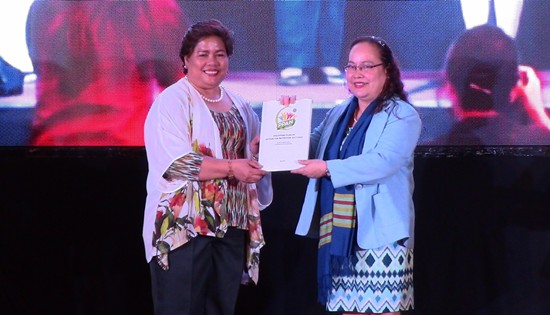
Assistant
Secretary of Health and NNC Executive Director Maria-Bernardita
Flores (left) presented to Health Secretary Paulyn Rosell-Ubial
the PPAN 2017-2022 Executive Summary during its launching on May
2, 2017 in Iloilo City. |
PPAN launched to
curb malnutrition in next 6 years
Press Release
May 5, 2017
TAGUIG CITY – All is
set for the Philippine Plan of Action for Nutrition (PPAN) 2017-2022
in addressing malnutrition in the country for the next six years as it
was officially launched on 2 May 2017 in Iloilo City. Health Secretary
Paulyn Ubial led the national launch together with other members of
the Governing Board of the National Nutrition Council.
Anchored on the Philippine
Development Plan, the PPAN is the country’s contribution to the
attainment of Sustainable Development Goals (SDGs) of the United
Nations, particularly SDG 2 which is to end hunger, achieve food
security and improved nutrition and promote sustainable agriculture.
Moreover, PPAN 2017-2022 also aims to support the World Health
Assembly Global Target to improve maternal, infant and young child
nutrition by 2025.
The new PPAN is a
results-based plan designed to achieve significant reductions in
different forms of malnutrition such as wasting, stunting,
micronutrient deficiencies and overweight and obesity in the
Philippines. It was constructed based on a landscape situational
analysis of nutrition in the Philippines which shows that the
prevalence of malnutrition in various forms remain high.
Based on the National
Nutrition Survey conducted by the Food and Nutrition Research
Institute (FNRI) in 2015, 33.4% or 3.8 million children are stunted
while 7.1% or 807,057 are wasted. It also showed that overnutrition
manifesting as overweight and obesity are emerging health concerns
among children and a major problems among adults with 18 million
Filipinos who are overweight and obese.
Micronutrient deficiency
which adversely affects a child’s survival also remains a public
health concern. Among pregnant women, 24.8% are nutritionally at risk
with iodine deficiency disorder affecting brain development of unborn
and very young children. The cost of malnutrition greatly affects the
country’s economy with a total loss of P328 Billion in 2013 due to
impacts of child stunting on education and productivity.
 As key to achieving
improvement in nutritional outcomes, PPAN’S strategic thrusts are the
First 1,000 Days of life, complementation of nutrition-specific and
nutrition-sensitive programs, intensified mobilization of local
government units and reaching Geographically Isolated and
Disadvantaged Areas (GIDAs) and communities of indigenous peoples.
As key to achieving
improvement in nutritional outcomes, PPAN’S strategic thrusts are the
First 1,000 Days of life, complementation of nutrition-specific and
nutrition-sensitive programs, intensified mobilization of local
government units and reaching Geographically Isolated and
Disadvantaged Areas (GIDAs) and communities of indigenous peoples.
The new PPAN features 8
nutrition-specific programs devised to address the immediate causes of
malnutrition such as inadequate food and nutrient intake, poor
caregiving and parenting practices, and the burden of infectious
diseases. This will be complemented by nutrition-sensitive programs
which are already existing developmental programs that can be tweaked
to produce nutritional outcomes. These programs will be enabled by
intensive mobilization of LGUs which will involve capacity-building
and mentoring on nutrition program management.
The PPAN 2017-2022 was
approved by the NNC Governing Board during its 1st meeting on 21
February 2017.
PH startup to
revolutionize postal system
By DTI-TIPG
May 4, 2017
MAKATI – The
Department of Trade and Industry’s Philippine Trade and Investment
Center (PTIC) in Singapore is working closely with four Filipinos from
Cebu who are presently based in Singapore, to officially introduce
Geopik, an app that will revolutionize the postal system in the
Philippines.
Filipinos Francisco Liwa,
Ivan Lacuesta, Rodessa Padrigano and John Ryan Loyloy utilize the
digital address system using geohashing and geolocation technologies
similar to that used by apps such as Waze or Google Maps.
Geopik converts long
addresses or the absence of house numbers which is common in the
Philippines, into more exact, customizable and easy-to-remember single
codes. The app reduces the hassle brought by additional information to
the actual address such as “house with blue gate, in front of a mango
tree” by simply converting addresses to simple digital codes.
Seeing the inefficiency in
the Philippines’ postal coding, the PH startup Geopik set out to offer
a solution to e-commerce, logistics, and other location-dependent
businesses.
“It’s such a unique
experience to help build something and be part of its growth from the
very beginning. This is our way of taking charge of our future and
making an impact back home in the process,” said GeoPik co-founder
John Loyloy.
Aligned with the Philippine
government’s thrust to develop an innovative entrepreneurial culture,
DTI supports startups and helps strengthen the innovation ecosystem in
the country through various initiatives such engaging startup
entrepreneurs.
In 2016, DTI launched the
QBO Innovation Hub situated at the DTI International Building, Makati
City. It is the first public-private innovation hub in the Philippines
that aims to provide support services to startup and innovation
entrepreneurs. The DTI partners with incubator and accelerator
Ideaspace Foundation, the Department of Science and Technology (DOST),
and JP Morgan.
In Singapore, parallel
initiatives are being done by the PTIC led by Commercial Counsellor
Glenn Peñaranda, who engages with the Filipino community by speaking
at investment seminars and online channels on entrepreneurship with
the goal of providing more job opportunities for Filipinos.
“Startups play a pivotal
role in driving innovation and economic growth hence we are happy to
help GeoPik reach out to decision-makers and to potential users. We
also look forward to work with more Filipino startups here in
Singapore and the region and help them scale up,” said Commercial
Counsellor Peñaranda.
|
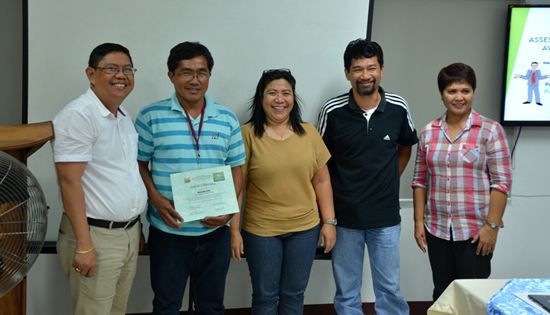
Official
of the MAALSADA FISCO (second from L) pose with (from L) Eulalio
Lagapa Jr., LBP-Lending Center Head; Maria Ugay, LBP Account
Officer; Roberto Cajipe, Development Facilitator; and Lilibeth
Imperial, DAR-Leyte APCP Coordinator, after having been
commended for their outstanding performance as program conduit
under the Agrarian Production Credit Program (APCP). |
DAR, LBP commend 7
Leyte farmers organizations
By JOSE ALSMITH L. SORIA
May 3, 2017
TACLOBAN CITY – Seven
agrarian reform beneficiary organizations (ARBOs) in Leyte province
were recently commended by the Department of Agrarian Reform (DAR) and
the Land Bank of the Philippines (LBP) for their outstanding
performance as program conduits.
LBP-Lending Center Account
Officer Maria Ugay disclosed that the seven ARBOs who availed of loans
under the Agrarian Production Credit Program (APCP) for their members
in 2016 were able to settle their respective accounts before the due
dates despite the member-farmer’s encountering losses in last year’s
farm operations.
Recognized during the recent
quarterly assessment and consultation were the Pastrana ARC Farmers
Organization (Pastrana, Leyte); MAALSADA FISCO (Alangalang, Leyte);
BAKDAW FISCO (Tabontabon, Leyte); Merida Agricultural Diversified
Services Multi-Purpose Cooperative (Merida, Leyte); Liberty Farmers
Savings and Credit Cooperative (Palompon, Leyte); Himamara Agrarian
Farmers Association (Mahaplag, Leyte) and the Tugas Farmers Agrarian
Reform Association (Bato, Leyte).
According to Zosimo
Estabillo, chairman of the Pastrana ARC Farmers Organization, they
used the association’s fund first in paying their obligation to the
bank as they collect additional 4.5 percent from members who availed
of the said loan.
Provincial Agrarian Reform
Program Officer-1 Paulina Canales explained that the quarterly
assessment and consultation is a venue for the ARBOs to air their
problems encountered especially on reasons why the member creditor
couldn’t pay his or her obligation.
During this occasion,
Canales added, a representative from the LBP-Lending Center offers
solutions to the affected ARBOs to avoid being penalized.
Likewise, a representative
from the Philippine Crop Insurance Company (PCIC) is invited to
explain to the ARBOs how the farmers could avail of crop insurance to
protect them from severe losses in times of calamities or pest
infestations.
Further, Meneleo Medino,
PCIC representative, encouraged the farmers to apply for crop
insurance for only P50 a year.
Common problem encountered
by the farmers during the last cropping season was the intense dry
spell caused by the El Niño phenomenon.
Meanwhile, Eulalio Lagapa
Jr., LBP-Lending Center Head, encouraged the ARBOs to maintain a good
standing so they could qualify for the said bank’s regular credit
programs when APCP ends.
DAR Regional Director Sheila
Enciso stressed that APCP is one of the agency’s support programs in
partnership with LBP and the Department of Agriculture extended to
ARBOs by offering agricultural production loans at 7.5 percent
interest rate per annum.
Estabillo described the
interest rate as much lower compared to that of traders who offer
credit assistance to farmers at the start of the cropping season.
In 2016, Ugay said, LBP
released P26.57 million to 35 ARBOs in Leyte and Biliran provinces
serving as conduits to 1,233 members who applied for APCP loan.
IRC, PBSP turn over
potable water systems to Iloilo farmers
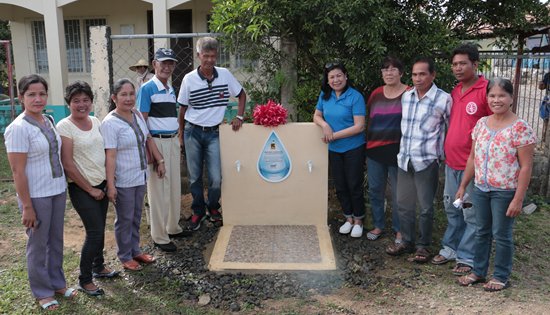
By
PBSP
April 28, 2017
CEBU CITY – For the
250 farmer-households from Iloilo, the search for safe drinking water
is over.
With support from global
donor International Rescue Committee (IRC)and Philippine Business for
Social Progress (PBSP), two level 2 potable water systems were
installed in Barangay Cano-an of Estancia and Barangay Cabagohan of
Batad.
The potable water system
project aims to support the province of Iloilo in addressing water
security issues in its poor communities, which further worsened when
Super Typhoon Yolanda (Haiyan) hit the province last November 2013.
Both potable water systems
feature improved source tanks, chlorinators, transmission,
distribution and service pipes, and tap stands that allow households
easy access to water.
Aside from these potable
water systems, the project also installed chlorinators in three
barangay water systems in Simsiman and Guiso located in Calinog,
Iloilo and Agusipan in Badiangan, Iloilo. The chlorinators benefited
240 households, who now have direct access to safe drinking water.
Addressing the national
demand for water is one of PBSP’s flagship initiatives. In 2015, its
business leaders with the United States Agency for International
Development (USAID) formed the Water Alliance to help find solutions
to the water security crises. The alliance focuses on rehabilitating
critical watersheds, adopting measures to lower water footprint and
treating wastewater at industry levels, and building the capacities of
water service providers.
Envisioned to become the
platform for companies to discuss issues on water security and access,
the Water Alliance already has 46 members from the business sector and
other stakeholders. To date, the Water Alliance has provided rural
water system projects as well as provided volunteer experts to help
assess and design water community systems for waterless areas. It has
also pooled the support from other companies to help manage and
conserve critical watersheds through upland and mangrove
reforestation.
|
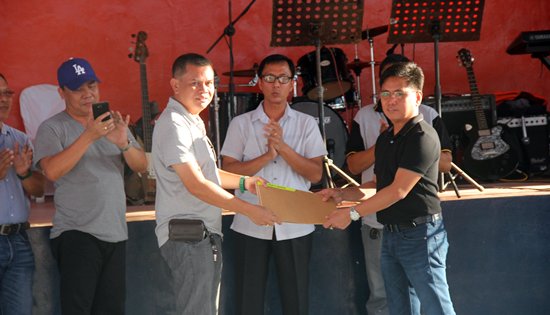
Engr.
Loreto M. Cedro (R) symbolically turns over files of the
Assistant District Engineer’s Office to the newly installed OIC
Assistant District Engineer Denis Cagomoc. |
2 SFDEO key
officials assume higher positions
By MARIAH KIM L. OITE
April 28, 2017
CALBAYOG CITY – Under
and by the virtue of Special Orders No. 53 and 54 series of 2017
released on April 4, 2017, Samar First District Engineering Office’s
two key officials are elevated into higher positions.
Former Chief of Planning and
Design Section, Engr. Denis C. Cagomoc is designated as
Officer-in-Charge of the Office of the Assistant District Engineer of
the same office which is vacated by Engr. Loreto M. Cedro.
Meanwhile, Engr. Cedrois
designated as Officer-in-Charge-Chief, Planning and Design Division of
DPWH Regional Office No. VIII, Palo, Leyte.
Spearheaded by District
Engineer Alvin A. Ignacio together with the Section Chiefs of Samar I,
the turn-over ceremony cum send-off party to the key officials is made
just recently at Samar I Covered Court.
Former ADE Cedro heartily
thanks District Engineer Alvin A. Ignacio for supporting him and his
endeavors during his stay in the office while the new ADE vowed to
continue what the former has started for the best interest of the
service.
Both are directed to perform
the duties and assume the responsibilities appurtenant to the above
mentioned positions pursuant to the provisions of Section 6 and 37 of
Executive Order No. 124.